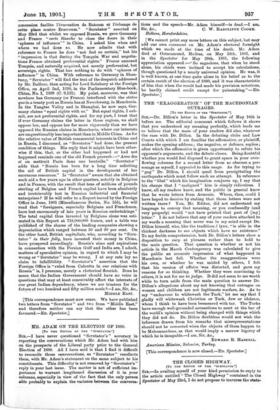THE "EXAGGERATION " OF THE MACEDONIAN OUTRAGES.
[To TEE EDITOR OF TRY "SPICTATOR.1 SIR,—Dr. Dillon's letter in the Spectator of May 16th is before me. The editorial comment which follows it shows that you understood my meaning perfectly, which leads me to believe that the mass of your readers did also, whatever the case with Dr. Dillon. In the debating clubs and Law Courts with which I am familiar the affirmative, or plaintiff, makes the opening address ; the negative, or defence, replies ; after which the affirmative is given opportunity to refute his opponent's arguments, and the debate closes. Being doubtful whether you would feel disposed to grant space in your over- flowing columns for a second letter from so obscure a per- sonage as myself, I appealed to this usage. As for trying to " gag " Dr. Dillon, I should quail from precipitating the earthquake which must follow such an attempt. In reference to the "libel" which his imagination conjures up, I say that his charge that I " maligned " him is simply ridiculous. I knew, all my readers knew, and the public in general knew that he wrote letters from Armenia. Whom, then, could I have hoped to deceive by stating that those letters were not written there ? You, Mr. Editor, did not understand my language to convey that meaning, or you confessedly (and very properly) would " not have printed that part of [my] letter." I do not believe that any of your readers attached to my words a meaning that never was in my mind except Dr. Dillon himself, who, like the tradition::) lynx, "is able in the thickest darkness to see objects which have no existence." To my feeble comprehension, both Dr. Dillon's letters show a disposition to carp at phrases rather than to hold to the main question. That question is whether or not his article in the March Contemporary was calculated to give the public an accurate impression of what happened in Macedonia last fall. Whether the exaggerations were his own, or whether he was misled by others, I felt that his version of affairs was distorted, and gave my reasons for so thinking. Whether they were convincing to others, it is not for me to judge. It did not seem to me worth while to turn aside from the main question to answer Dr. Dillon's allegations about my not knowing that outrages on women and children are not legitimate warfare, &c. As' to my " endeavour to whitewash the Turk," let me say that I gladly will whitewash Christian or Turk, Jew or idolater, whom I think to have been besmeared with tar. The Turks have enough well-grounded accusations to meet at the bar of the world's opinion without being charged with things which they did not do. Dr. Dillon doubtless would not wish the inference drawn from his remarks that misrepresentations should not be corrected when the objects of them happen to be Mahommedans, as that would imply a narrow bigotry of which he is incapable.—I am, Sir, dtc., [This correspondence is now closed.—ED. Spectator.]










































 Previous page
Previous page